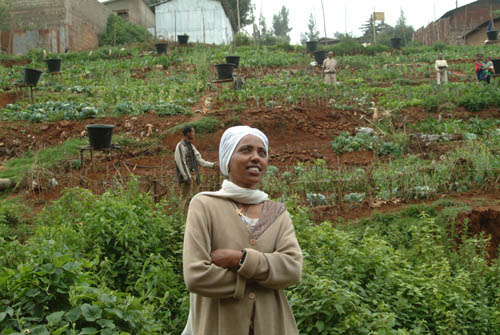Bernard BOUYE
This post is also available in:
 French
French
«Quand j’ai appris que j’étais séropositive, j’ai reproché à mon mari de ne pas m’avoir dit qu’il avait été contaminé par le virus du SIDA. Et je l’ai quitté ». Alem a 30 ans, 3 enfants et désormais pour seul moyen de subsistance ce lopin de terre octroyé par le gouvernement éthiopien. D’Addis-Abeba à Gondar en passant par Bahir Dar, Des-sie, Awassa et Nazreth, près de 10.000 personnes, pour La plupart des femmes et des enfants séropositifs travaillent dans ces fermes urbaines. « Grâce à leurs récoltes, ces personnes bénéficient d’une alimentation équilibrée, mais aussi d’une rentrée financière», précise Kimberley Flowers, porte-parole d’USAID, l’association américaine qui cofinance ce projet d’agriculture biologique et de soins au VIH, est sans doute un des programmes les plus abouti d’Ethiopie, sinon d’Afrique.
“When I discovered I was infected by the HIV virus, I blamed my husband for not having told me about it, and I decided to leave him”.
All that Alem, a 30 year old mother with 3 children, has to maintain her family is a small piece of land given to her by the Ethiopian government.
From Addis-Abeba to Gondar, passing through Bahir Dar, Des-sie, Awassa et Nazreth, about 10.000 people, mostly HIV positive women and children, work on these urban farms. “Thanks to the harvest they can eat healthy food and have an income at the same time”, says Kimberly Flowers, the spokesperson of USAID, an American association which funds the project, one of the most successful in Ethiopia, if not the whole of Africa.



